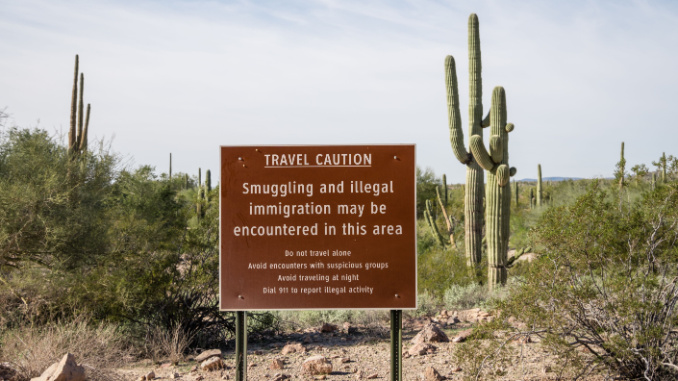
by Ethan Faverino | Dec 18, 2025 | News
By Ethan Faverino |
U.S. Representative Abe Hamadeh (R-AZ-08) has sent a sharply worded letter to the Acting Chairwoman of the Commodity Futures Trading Commission (CFTC), Caroline D. Pham, seeking answers and potential regulatory action regarding the newly announced partnership between prediction-market platform Kalshi and CNN.
In the letter, Congressman Hamadeh warns that the collaboration “poses direct and foreseeable threats to market integrity, democratic stability, and American national security,” arguing that it creates an unprecedented structural conflict of interest by allowing a major news organization to both report on and financially benefit from high-stakes geopolitical events.
“CNN would be uniquely positioned to shape public perception and news cycles around the very events Kalshi lists as tradable markets,” said Congressman Hamadeh. “These events would involve elections, war, foreign policy crises, and domestic instability. No other major media outlet has attempted such a partnership, and for good reason: it creates a built-in structural conflict of interest that allows an influential news organization or foreign adversaries to shape outcomes for financial or competitive advantage.”
The congressman highlighted Kalshi’s existing controversial markets, including contracts that reportedly allowed trading on whether Palestinians in Gaza would suffer mass starvation or when Israel might conduct military actions in Gaza or the West Bank—markets he described as “chilling.”
Specifically, the congressman posed four questions to the CFTC:
- What actions is the Commission taking to review the CNN-Kalshi partnership under Section 5c(c)(5)(C), with respect to informational conflicts of interest and event manipulation?
- Is the CFTC assessing whether the partnership creates vulnerabilities for foreign or domestic actors to influence U.S. politics, economics, or national security for financial profit?
- Has the Commission evaluated whether CNN’s editorial influence, combined with Kalshi’s event contracts, renders these markets “contrary to the public interest?”
- What steps will the CFTC require to ensure robust compliance controls, including editorial firewalls, conflict-of-interest disclosures, and foreign-influence screening?
Hamadeh gave Acting Chairwoman Pham 30 days to provide a detailed written response outlining the Commission’s assessment and planned actions.
“My constituents have raised alarm bells about a media company with a long-documented record of partisan manipulation now positioning itself to influence and profit from geopolitical events in real time,” stated Hamadeh. “This partnership is not merely inappropriate; it is outright dangerous.”
He concluded, “The CFTC’s mission is to safeguard the integrity of U.S. markets, and allowing CNN, a network already viewed by many Americans as a propagandistic actor, to operate inside a live prediction market creates unacceptable national-security and governance vulnerabilities.”
Ethan Faverino is a reporter for AZ Free News. You can send him news tips using this link.

by Jonathan Eberle | Dec 18, 2025 | News
By Jonathan Eberle |
Arizona state Rep. Nick Kupper (R-LD25) has introduced legislation that would allow higher speed limits on certain rural interstate highways, citing roadway design, safety data, and differences between urban and rural driving conditions.
House Bill 2059, known as the Reasonable and Prudent Interstate Driving (RAPID) Act, would give the Arizona Department of Transportation authority to designate limited stretches of rural interstates as “derestricted” speed zones for non-commercial vehicles during daylight hours. The proposal maintains an 80-mile-per-hour maximum speed limit at night and preserves existing laws addressing unsafe or reckless driving.
Under the bill, ADOT would determine which highway segments qualify based on engineering studies, roadway design standards, and historical safety records. The legislation also increases civil penalties for drivers who misuse the derestricted zones, including those who engage in aggressive or dangerous driving behavior.
The measure requires annual safety audits of any approved segments and directs ADOT to coordinate enforcement efforts with the Arizona Department of Public Safety. In addition, the bill calls for a public education campaign to ensure drivers understand expectations in derestricted zones, including proper lane use and passing rules.
The proposal would begin with a one-year pilot program on a segment of Interstate 8. Any continuation or expansion would depend on safety outcomes and compliance with the bill’s requirements.
“Most drivers can tell the difference between a crowded city freeway and a wide-open stretch of rural interstate,” Kupper said in a statement. “The RAPID Act accounts for that difference. It will let us raise speeds where it’s safe, keep tough penalties for reckless driving, and update our laws to reflect how people actually use these roads.”
Kupper pointed to Montana’s former “reasonable and prudent” daytime speed standard as a precedent. According to a review by Montana’s Legislative Audit Division, average speeds increased after posted daytime limits were removed, but crash and fatality rates per vehicle mile traveled continued to decline and remained comparable to neighboring states. The audit concluded that factors such as seatbelt use and driver behavior had a greater effect on safety outcomes than posted speed limits alone.
“Montana showed that you can modernize speed laws without sacrificing safety,” Kupper said. “When rules are clear and focused on driver behavior, states can let safe highways operate as they were designed to operate.”
Jonathan Eberle is a reporter for AZ Free News. You can send him news tips using this link.

by Staff Reporter | Dec 17, 2025 | News
By Staff Reporter |
Wealthy leftists outside the state are paying big money to deepen the blue in Arizona.
An investigative report by the Arizona Free Enterprise Club (AFEC) and AZ Liberty Network (AZLN) documented the way national organizations are funding to strengthen Democratic politics in Arizona: Donor Advised Funds, dark-money intermediaries, and teachers’ unions.
AFEC and AZLN found the flow of funds totaled over $1 billion, at least.
Per the report, these tax-advantaged funds don’t arrive in Arizona directly. The millions change hands between different organizations before coming into the state, sometimes multiple times, effectively turning the money dark.
“Money enters the system tax-free, travels invisibly, and reemerges as ‘local’ influence with national fingerprints erased,” reads the report. “The result is a tax-advantaged, publicly underwritten, and union-fueled political machine that dwarfs traditional party structures, and it has reshaped Arizona’s civic landscape. It is not organic, spontaneous, or homegrown—it is manufactured, calculated, and imported, creating an institutionalized system of progressive infrastructure.”
The money flow begins with what the report calls “Upstream Sources.” Two cost-saving vehicles make the funding flows a reality: tax-advantaged Donor Advised Funds (DAFs) and direct taxpayer subsidization available through federal grantmaking. The former includes funds like Fidelity Charitable, Silicon Valley Community Foundation, and Rockefeller Advisors. The latter vehicle largely operates through USAID. This agency gave the Tides Center $25 million to combat “misinformation.”
In 2024, the report found the Upstream Sources spent over $33 million in Arizona in non-federal races — a key year for determining which party would control the state legislature.
Altogether, Upstream Sources sent over $1 billion to organizations that acted as intermediaries — “Intermediary Organizations” — such as Sunflower Services (until recently, Arabella Advisors), Tides Nexus, and networks backed by billionaires George Soros or Hansjörg Wyss. Soros and Wyss also act as Upstream Sources.
From there, these funds finally make their way into Arizona. Top recipients that received millions include One Arizona, LUCHA, ACE, Chispa, Arizona Mirror, and the Copper Courier: the “Arizona Groups,” per the report.
The report alleged that the last two nonprofits listed, Arizona Mirror and Copper Courier, are news sites run by “Democratic operatives.”
Arizona Groups spent over $7 million to support down-ticket legislative Democrats, and nearly $5 million against the Republicans.
Further on the report mapped out how teachers’ unions fund local political action committees to influence Arizona races.
“These taxpayer-funded transfers, ostensibly for professional development or services, ultimately help free funds to support the same partisan infrastructure advancing the Left’s political objectives across Arizona,” stated the report.
Additionally, the report noted that the Arizona Education Association shares its headquarters building with other progressive organizations, such as One Arizona.
AFEC’s press release on the report interpreted the flow of funds as national influencing of local issues.
“This isn’t activism, it’s a professional, tax-advantaged political operation designed to look local but controlled from afar,” stated AFEC. “Arizona isn’t changing — it’s being engineered. Conservatives need a clear roadmap, strong counter-infrastructure, and strategic engagement to protect the state’s future and preserve local control.”
AFEC President Scot Mussi told “Winn Tucson” that the report was inspired by the USAID scandal around the time of President Donald Trump’s inauguration. That prompted curiosity about the origins of funding for Arizona’s major progressive political organizations.
AZ Free News is your #1 source for Arizona news and politics. You can send us news tips using this link.

by Jonathan Eberle | Dec 17, 2025 | News
By Jonathan Eberle |
Arizona Senate Republicans released their 2026 Majority Plan on Monday, outlining policy priorities aimed at reducing the cost of living, strengthening public safety, supporting economic growth, and increasing oversight of state government.
The plan follows several years of divided government at the Capitol and builds on what Republicans describe as recent legislative accomplishments, including balanced budgets and multiple tax cuts passed without raising overall taxes. Caucus leaders say the 2026 agenda is intended to address challenges facing Arizona families, particularly rising housing costs, inflation, and concerns about government accountability.
“Arizonans want affordable living, safe neighborhoods, and a government that strengthens — not weakens — our economy,” Senate President Warren Petersen said in a statement. “While the Governor’s vetoes stall progress, Senate Republicans remain focused on protecting taxpayers, upholding Arizona’s freedoms, and preventing the radical left from turning our state into California.”
A central component of the plan is a proposed tax and budget framework aimed at providing relief from rising prices. Senate Republicans say they are pursuing reductions in state taxes on tips and overtime, expanded deductions for seniors, and policies to support small businesses. Caucus leaders estimate the proposals would return more than $1 billion to taxpayers over three years while pairing tax relief with restrained government spending.
Housing affordability is another major focus. The plan cites regulatory barriers, slow permitting processes, and executive-level actions as factors contributing to Arizona’s housing shortage. Republicans say they support reforms to speed up construction, reduce fees, and limit local restrictions on new housing, while aligning development decisions with water availability data.
“Arizonans can’t afford policies that stall development, inflate housing prices, or jeopardize our water security,” Senate President Pro Tempore T.J. Shope said. “Senate Republicans are advancing practical, data-driven solutions that support responsible growth and keep Arizona livable for the next generation.”
Water policy is addressed alongside housing, particularly as negotiations over the Colorado River continue. The plan emphasizes the Legislature’s statutory role in those talks and calls for shared conservation efforts among basin states to avoid placing disproportionate burdens on Arizona.
Public safety proposals include addressing staffing shortages in correctional facilities, increasing oversight of state agencies, and strengthening accountability for violent offenders and probation violators. The plan also reiterates support for Second Amendment protections and public safety pension stability.
Senate Majority Leader John Kavanagh criticized the current administration’s record, saying, “Arizonans deserve leadership that solves problems, not a wolf in sheep’s clothing who blocks solutions and hopes voters won’t notice.”
Additional priorities outlined in the plan include border security enforcement, election integrity measures, education policy, transportation and infrastructure investment, emergency preparedness, artificial intelligence safeguards, family court reform, veterans’ services, and oversight of agencies such as AHCCCS and the Department of Child Safety. Opening day of the second regular session of the 57th Legislature is scheduled for January 12, when many of the proposals are expected to be introduced.
Jonathan Eberle is a reporter for AZ Free News. You can send him news tips using this link.

by Matthew Holloway | Dec 17, 2025 | News
By Matthew Holloway |
House Republicans, led by Arizona Congressman Abe Hamadeh (R-AZ-08), unveiled legislation Friday proposing the creation of a permanent national memorial in Washington, D.C., honoring Americans killed by individuals unlawfully present in the United States.
The proposal would establish a permanent memorial dedicated to victims of crimes committed by illegal immigrants, a category House Republicans say has been overlooked in national remembrance efforts.
At a Friday press event, Hamadeh said the bill “authorizes a permanent national memorial in Washington, D.C., honoring U.S. citizens and lawful residents whose lives are taken by individuals unlawfully present in the United States.” He added, “But in many ways, it also shames the politicians who allowed this situation to happen.”
In a later post to X, he wrote in part, “Humbled and grateful to lead this effort to establish a memorial in honor of the victims of Biden’s border crisis. Thank you to the incredible Angel Parents for sharing their experiences, my congressional colleagues for joining this effort, and the @TABSReport American Border Story for fighting alongside us.”
According to Fox News, the legislation is being led by Republican lawmakers who say the memorial would serve as both a place of remembrance and a public acknowledgment of the consequences of federal immigration policy failures. The proposal calls for a federally designated site that would memorialize victims while remaining nonpartisan in its presentation.
Newsmax reported that eight co-sponsors, all Republicans, joined Hamadeh, that The American Border Story (TABS) would raise funds for the monument from private sources, and that Aagel families would select a design and an architect.
Congressman Andy Biggs (R-AZ-05) attended the event alongside Hamadeh and highlighted the disparity between the Biden and Trump administrations’ responses to enforcing immigration law. “They ended the Remain in Mexico policy, restarted catch and release,” he told reporters.
TABS Executive Director Nicole Kiprilov told Fox News, “I’d like to thank President Trump for leading an historic administration that has put these victims and families at the center of our immigration agenda.”
“Secretary Kristi Noem, border czar Tom Homan and the entirety of the Trump administration has been working night and day tirelessly to ensure that our border is secure and that these tragedies that the Biden administration allowed to happen will never happen again,” she added.
The proposal comes amid ongoing debates in Congress over border security, immigration enforcement, and the humanitarian and public safety impacts of illegal immigration. Republicans have repeatedly cited crime victimization as part of the broader argument for stronger border controls and immigration reforms.
Democrats have previously criticized similar proposals, arguing that crime rates among immigrants do not justify singling out a specific category of offenders. The Fox News report notes that the legislation is expected to face opposition as it moves through the legislative process.
Matthew Holloway is a senior reporter for AZ Free News. Follow him on X for his latest stories, or email tips to Matthew@azfreenews.com.

by Staff Reporter | Dec 16, 2025 | Education, News
By Staff Reporter |
The leadership at one BASIS Charter School allegedly told families they were required to honor one of their coach’s new transgender identity.
Community members shared an email they claimed to have obtained a copy of from Basis Chandler Primary North, an elementary school, which advised parents to have themselves and their children abide by nondiscrimination policies in relation to the physical education coach, Michael Jahrman — now “Lily” Jahrman.
The email allegedly told parents that they should tell their children not to question Jahrman’s gender or gender identity.
“Coach Jahrman has recently undergone a personal transition and will now be known as Lily Jahrman. Students may continue to use ‘Coach’ when addressing this staff member,” stated the email. “BASIS follows all nondiscrimination policies, including those related to gender, and remains committed to providing a respectful and supportive environment for every student and employee. Please take a moment to let your child know that Coach’s appearance has changed so that PE classes can continue smoothly without unnecessary questions. Coach’s focus remains on teaching and supporting students in PE.”
School policy provides further context for the implications of this email. The policy indicates that an elementary school student who misgenders or deadnames Jahrman would be subject to discipline. “Deadnaming” refers to calling an individual by their given name that preceded their gender transition.
BASIS Charter Schools’ code of conduct clarifies it maintains “a zero tolerance policy toward any language or behavior that intimidates, belittles or causes physical or emotional injury to others.” This zero tolerance policy allows each school to have discretion over the disciplinary consequence(s) administered.
The code of conduct also prohibits an undefined, non-comprehensive list of “certain behaviors,” including “derogatory statements” referencing any individual’s “sexuality [or] gender expression.”
Further on, the code of conduct clarifies that nondiscrimination policy expands to “actual or perceived classification protected by law.” Associated training materials clarify that the Title IX sex discrimination prohibition extends to gender identity and expression.
“Students must observe the school’s policies pertaining to behavior, respect, and anti-harassment/non-discrimination in all interactions with peers and school staff,” states the code of conduct. “Students may not engage in speech that is threatening, vulgar, or harassing.”
Court records revealed that Jahrman filed an application for change of name of an adult back in mid-September before the Maricopa County Superior Court. A judge signed the order several days before Thanksgiving.
Jahrman’s social media activity shows that he has frequently interacted with Occupy Democrats.
In one post by Occupy Democrats comparing President Donald Trump to a dictator in 2020, Jahrman expressed disappointment with the federal government.
“None of this would be happening, the corruption, incompetence, manipulation, or destruction if Trump were not elected. The day he was elected was the day this was all put into action,” said Jahrman. “I hope people have learned what they did and never make this mistake again.”
In a post by OK! Magazine covering Vice President J.D. Vance’s post-COVID-19 vaccine illness in February, Jahrman said Vance couldn’t have been sick because he doesn’t possess a heart.
“Lie, he doesn’t have a heart,” commented Jahrman.
AZ Free News is your #1 source for Arizona news and politics. You can send us news tips using this link.






